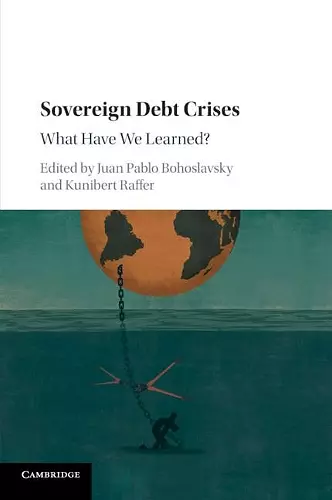Sovereign Debt Crises
What Have We Learned?
Juan Pablo Bohoslavsky editor Kunibert Raffer editor
Format:Paperback
Publisher:Cambridge University Press
Published:20th Dec '18
Currently unavailable, and unfortunately no date known when it will be back
This paperback is available in another edition too:
- Hardback£105.00(9781316510445)

Contributes to a better understanding of the policy, economic, and legal options of countries struggling with debt problems.
This book aims at improving the understanding of debt crises and of how to resolve them while protecting human rights and the debtor's economic recovery. To do so, it analyzes fourteen unique or singular debtor countries - some regarded as successful, some as unsuccessful in dealing with debt crises.There is an obvious need to learn more about why some countries succeed and others fail when dealing with debt crises. Why do some sovereign debtors overcome economic problems very quickly and at minor human rights costs for their people, while others remain trapped by debts for years struggling with overwhelming debt burdens and exacerbating economic problems and human suffering? This book analyzes fourteen unique or singular country cases of sovereign debt problems that differ characteristically from the 'ordinary' debtor countries, and have not yet received enough or proper attention - some regarded as successful, some as unsuccessful in dealing with debt crises. The aim is to contribute to a better understanding of the policy options available to countries struggling with debt problems, or how to resolve a debt overhang while protecting human rights, the Rule of Law and the debtor's economic recovery.
'Countries respond to sovereign debt crises in remarkably different ways and with remarkably different results. Some are handled well and produce only limited social, financial and political disruption. Others are mangled, with terrible consequences both for the citizens of the debtor country and the country's creditors. The essays compiled by Messrs, Bohoslavsky and Raffer in this timely book survey these precedents and astutely distil the relevant lessons.' Lee C. Buchheit, Cleary, Gottlieb Steen and Hamilton LLP
'Sovereign debt crises have always been with us, and they always will be, like it or not. The contributors to this book provide a detailed look back at some of the most important episodes. In addition, and more importantly, they offer a way forward. Their ideas for how to handle such crises are much needed; one can only hope that the international policy community will listen.' Barry Eichengreen, George C. Pardee and Helen N. Pardee Professor of Economics and Political Science, University of California, Berkeley
'The indispensable guide to the modern history of debt crises.' James K. Galbraith, author of Welcome to the Poisoned Chalice: The Destruction of Greece and the Future of Europe
'This volume confronts a vital question - why do sovereign debt crises persist, despite the vast intellectual and policy effort invested in fighting them? The book's core contribution is to cast a wide net geographically, with broad country coverage, temporally, by examining developments before and after the acknowledged crisis period, and analytically, by embracing legal, historical, philosophical, and economic perspectives on the debt problem. That the authors are able to distill all this knowledge into pragmatic prescriptions for incorporating human rights and human welfare into debt thinking is an achievement to celebrate.' Anna Gelpern, Georgetown University, Washington, DC
ISBN: 9781316649947
Dimensions: 230mm x 151mm x 16mm
Weight: 440g
308 pages